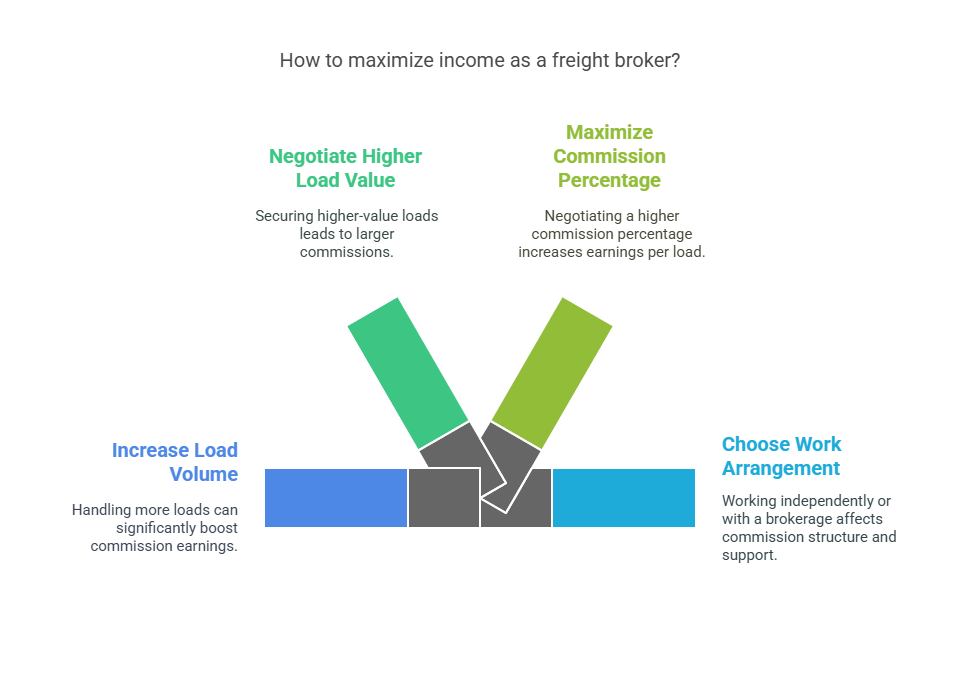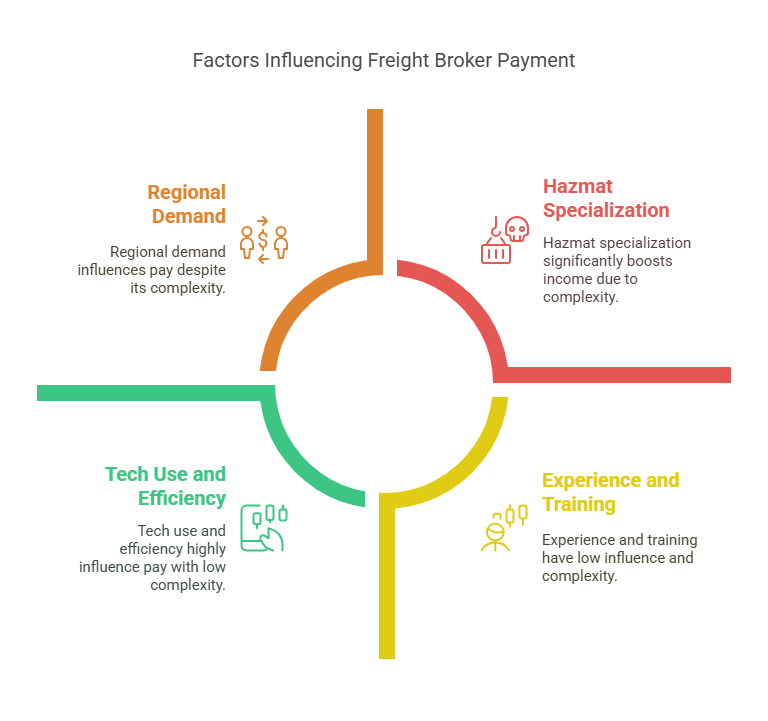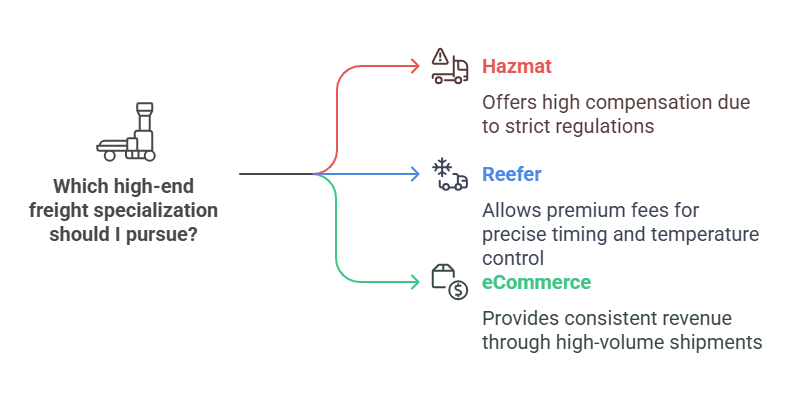The freight brokerage industry is booming, and with increasing demand for logistics professionals, many are curious about how much money freight brokers and freight agents can realistically earn. Whether you’re considering becoming an independent broker, a freight agent, or joining a logistics team, understanding the earning potential is essential to building a successful career in transportation.
Freight Broker Income
Freight brokers and agents typically earn money through commissions on loads they successfully arrange. Their total income depends on several variables:
- Number of loads they handle
- Value of each load
- Commission percentage (usually 10% to 35%)
- Whether they work independently or with a brokerage
For example, an agent arranging $100,000 in freight monthly at a 20% commission rate could earn $20,000 a month. But an entry-level broker handling $25,000 might only bring in $2,500 for the same period.
According to Indeed (2024), the average freight broker in the U.S. earns between $58,000 and $90,000 annually, depending on their business model and freight volume (Indeed, n.d.).

“Understanding commission structures and tracking cost-per-load can help brokers forecast income and optimize operations.”
What strategies do you think are essential for reaching the highest pay levels in freight brokerage?
What Influences Freight Broker Payment?
Several factors impact freight broker pay, including:
1. Experience and training: Brokers with several years in the industry tend to command higher income due to their deep understanding of logistics, stronger negotiation skills, and established client base. Training programs and certifications can also boost credibility and earnings.
2. Industry niche (e.g., flatbed, reefer, hazmat): Specializing in high-demand or complex freight types often results in higher commission percentages. For example, brokers handling hazmat loads usually earn more due to the regulatory complexity and risk involved.
3. Regional demand and competition: Pay rates vary based on regional supply chain needs. In areas with high shipping activity but few brokers, rates tend to be higher. Conversely, saturated markets can push commission percentages down.
4. Direct carrier relationships: Brokers who build strong relationships with reliable carriers often secure better rates and consistent loads, which can improve margins and increase overall revenue.
5. Tech use and operational efficiency: Brokers using advanced transportation management systems (TMS) and automation tools can handle more volume with fewer errors, reducing operational costs and maximizing income potential (FreightWaves, n.d.).
For example, the trucking broker salary can fluctuate depending on whether you’re handling spot market loads or contracted freight. Similarly, freight broker pay increases with better negotiation skills and time management.

“A seasoned freight broker’s ability to adapt to market conditions and build long-term relationships with both clients and carriers is one of the most critical drivers of consistent income growth.“
How do you think the adoption of new technologies in logistics will influence freight broker salaries in the next 5 years?
Freight Broker and Freight Agent Earnings
While the roles of freight agents and broker agents may appear similar, they differ in structure and compensation. Here’s a breakdown of their income potential:
- Freight agents operate as independent contractors under a brokerage license. They often earn commission splits of 50% to 70%, resulting in annual earnings of $40,000 to $90,000. Their income grows through volume and strong relationships with shippers.
- Freight agent salary tends to improve with client loyalty, niche specialization, and access to competitive carrier rates. For instance, an agent specializing in cross-border shipments may command higher margins.
- Freight broker agents work under a licensed broker and focus on sales and account management. They typically earn commissions of 50%–70%, with total income ranging from $50,000 to $100,000.
- ·Freight broker agent salary reflects the ability to build a book of business. A skilled agent who secures long-term clients with regular weekly loads can rapidly increase earnings (FreightWaves, n.d.).
For example, a broker agent who handles a consistent route for a large retail distributor may earn six figures simply by managing that relationship and ensuring timely load coordination.
For anyone exploring the field, here are realistic annual income ranges based on role:
| Role | Typical Annual Income |
| Freight Agent | $40,000–$90,000 |
| Freight Broker Agent | $50,000–$100,000 |
| Independent Freight Broker | $60,000–$150,000+ |
| Specialized Brokers (Hazmat, Reefer) | $80,000–200,000+ |
“Your niche, negotiation skills, and volume of repeat clients are more predictive of income than years in the business.”
Are you ready to take your freight agent career to the next level? Click here to learn more about Freight Broker Solutions.
High-End Freight Brokers
Top-tier freight brokers often specialize in complex, time-sensitive, or regulated freight. These niches command higher rates and require advanced knowledge, but they also offer some of the best compensation in the industry.
- Hazardous materials (hazmat) require brokers to follow strict regulations, increasing their value and compensation.
- Refrigerated freight (reefer) for perishable goods demands precise timing and temperature control, allowing brokers to charge premium fees.
- High-volume eCommerce contracts involve managing numerous daily shipments, providing scale and consistent revenue.
These highest paid freight brokers often maintain fewer but higher-margin clients. A freight broker handling government defense shipments reported $275,000 in annual income in 2023 (DAT Freight & Analytics, n.d.).

“High-revenue brokers don’t handle more loads; they handle more profitable ones.”
What strategies do you think new brokers should consider when trying to break into these specialized, high-revenue areas like hazmat or reefer freight?
How much do independent freight brokers make?
Independent freight brokers operate under their own license, giving them control over their operations, clients, and profit margins. This independence translates into higher potential income, but also more responsibility.
- Most Independent freight brokers earn between $60,000 and $150,000 annually, depending on how much freight they move and their operational efficiency.
- Independent freight broker salary increases significantly when brokers adopt tools like TMS platforms, hire dispatchers, or build a small team. With these systems, some independent brokers surpass $200,000. For example, LoadPilot reports that users who automate quoting and load tracking boost revenue by 30% (LoadPilot, n.d.).
Consider this: a broker managing $1 million in freight annually at a 30% margin will generate $300,000 in gross earnings. After deducting expenses for staff, software, and marketing, they could take home over $180,000.
“Independent freight brokers have the potential to earn significantly more than their employed counterparts, if the client base and the system are well built.”
Specialized Freight Brokerage Roles and Salaries
Niche roles in freight brokerage offer targeted earning opportunities for professionals who focus on specific market segments:
- Trucking broker salary fluctuates based on location and freight lane profitability. Midwest and Southeast lanes often offer consistent volume.
- Transportation broker salary typically ranges from $50,000 to $100,000. This title may involve managing different modes like rail and drayage.
- Freight broker pay is often commission-based, with bonuses tied to monthly revenue milestones.
- Cargo broker salary varies with the value and risk of transported goods. Handling high-insurance freight can lead to above-average pay.
- Truck load broker salary is higher for those specializing in full truckload (FTL) shipments, as these bring larger margins than less-than-truckload (LTL).
- Logistics broker salary can reach $110,000+ when managing multiple modes of transport and high-volume supply chain contracts.
“Specialized freight segments like heavy haul and reefer tend to drive the most consistent profits.”
Looking for ways to increase your earnings as an independent freight broker? Click here to explore opportunities for Independent Freight Brokers.
Frequently Asked Questions (FAQs)
What is the difference between employed and independent freight brokers?
Employed freight brokers typically work for a brokerage company and earn a base salary with performance bonuses or commission. Independent freight brokers operate under their own authority, keep a higher share of the commission, and manage their own client base and carrier network. While independent freight broker salary can exceed $150,000, it requires licensing, bonding, and self-sourced clients.
How much do freight brokers make a week?
Weekly income varies: entry-level brokers may earn $1,000–$1,500, while experienced brokers with large volumes can earn $3,000 or more, depending on freight margins and commission agreements.
How much does a freight broker agent make compared to an average freight broker salary?
Freight broker agents typically earn from $50,000–$100,000 annually, depending on commission splits (usually 50–70%). In contrast, the average freight broker salary ranges from $58,000 –$90,000, with independent brokers often exceeding this through higher margins.
How much do truck brokers make, and how does it compare to freight broker average income?
Truck brokers (specializing in truckload freight) earn $60,000- $120,000 yearly, influenced by lane profitability and volume. The freight broker average income sits around $70,000, but truck brokers in high-demand regions or niches (e.g., reefer) often outperform this benchmark due to premium rates.
Who are the highest paid freight brokers?
The highest paying freight brokers typically focus on government contracts, hazmat, reefer, or international freight. Brokers managing multi-million-dollar contracts can earn $200,000 or more annually.
Maximize Your Earning Potential
The world of freight brokering offers tremendous financial opportunity for motivated professionals. Whether you’re evaluating the freight broker’s salary, launching as a new agent, or aiming to become one of the highest paying freight brokers, the potential is there for high income and career growth. Understanding your earning capacity, whether as an agent, broker, or specialist gives you the clarity to make strategic decisions in this dynamic industry.
Ready to grow your freight career? Contact Us to discover how becoming a freight agent with SPI can give you the tools, support, and network you need to reach your full earning potential.
References
DAT Freight & Analytics. (n.d.). Average freight broker rates and data. Retrieved from https://www.dat.com
FreightWaves. (n.d.). Freight agent commission structures explained. Retrieved from https://www.freightwaves.com
Indeed. (n.d.). Freight broker salary information. Retrieved from https://www.indeed.com
LoadPilot. (n.d.). Freight broker software and revenue tools. Retrieved from https://www.loadpilot.com




